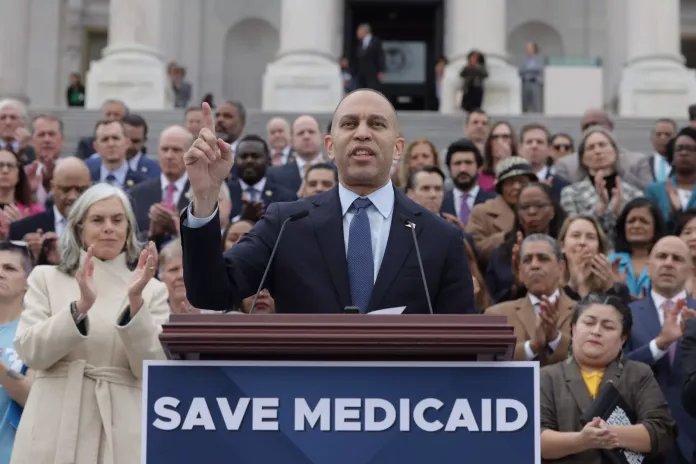Republican Study Committee’s goal: Achieve federal budget balance within seven years.
The House Republican Study Committee (RSC) has unveiled an exciting 2024 budget proposal that not only aims to balance the federal budget in just seven years, but also champions conservative values, strengthens national defense, stabilizes Social Security, and slashes taxes for businesses and individuals.
According to Caucus Chairman Kevin Hern (R-Okla.), this budget is a clear reflection of the Republican values. He stated, “It all boils down to something we’ve heard the president [Joe Biden] say quite a few times this year. Show me your budget, and I’ll show you your values. Our values are clearly on display with this budget.”
Hern further emphasized the key priorities of the budget, saying, “We’re protecting life. We’re defending our borders. We’re strengthening our military. We’re cutting taxes for working families, helping small businesses thrive, saving Medicare and Social Security for future generations, and unleashing American energy production. And we’re just getting started.”
The Caucus members presented this budget proposal as a solution to what they perceive as the unsustainable fiscal path set by the Biden administration. Rep. Ben Cline (R-Va.), chair of the RNC budget task force, criticized the reckless policies of President Biden and congressional Democrats, which have resulted in a record $10 trillion in new spending, historic inflation, and massive interest rate hikes.
The budget includes commonsense reforms that aim to reduce spending by $16 trillion over the next 10 years, with a focus on cutting nondefense discretionary spending by $5 trillion. Rep. Roger Williams (R-Texas) expressed his confidence in the budget, stating, “There’s two ways to keep the books. You can cook the books or you can balance the books. This right here balances the books.”
Let’s take a closer look at some of the major provisions in this budget:
Spending at 2022 Levels
This budget proposes to reduce nondefense discretionary spending to the 2022 level, which was originally proposed by Republicans. This level was revised during debt ceiling negotiations between House Speaker Kevin McCarthy (R-Calif.) and Biden. However, as Rep. Cline clarifies, the negotiations set a ceiling on spending, not a floor. Therefore, if the appropriations committee chooses to spend less than the ceilings, it is completely within the framework.
Stabilize Social Security and Medicare
The RNC plan addresses the impending insolvency of the Social Security and Medicare trust funds, which is projected to occur in about 10 years. Failure to address this issue would result in a 23 percent cut in benefits over the next decade. The proposed budget aims to expand consumer choice and provider competition in Medicare to lower premiums. It also suggests increasing the age of eligibility to 69, gradually increasing by three months per year for individuals who are currently 59 years old or younger.
Shrink the Federal Government
Several provisions in the budget aim to limit the power of the federal government in regulating businesses. One such provision suggests reinstating the Trump administration’s executive orders, which required the elimination of two federal regulations for every new regulation adopted. Additionally, the budget proposes abolishing the Consumer Financial Protection Bureau and the Federal Insurance Office.
Reduce Taxes
The budget proposal includes the repeal of approximately $553 billion in green-energy tax credits and around $350 billion in tax increases on businesses. It also suggests rescinding $80 billion in funding provided to the IRS over the next 10 years to ensure the payment of federal taxes. Furthermore, the budget aims to lower taxes on businesses that invest in manufacturing equipment, create a new category of tax-free individual retirement savings accounts, and abolish the tax.
" Conservative News Daily does not always share or support the views and opinions expressed here; they are just those of the writer."




